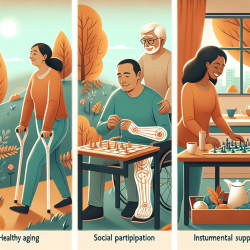Introduction
Osteoarthritis (OA) is a prevalent condition that significantly impacts the quality of life, particularly in terms of social participation. A recent study titled "Examining the longitudinal associations between activity limitations, instrumental supports and social participation in osteoarthritis: A CLSA population-based study" provides valuable insights into how activity limitations and instrumental supports affect social participation over time. This blog will explore how practitioners can leverage these findings to enhance their skills and encourage further research.
Key Findings from the Study
The study utilized data from the Canadian Longitudinal Study on Aging, focusing on individuals aged 45-85 with OA. It highlighted several critical points:
- Activity limitations tend to increase over time, negatively impacting social participation.
- Baseline social participation intensity is a strong predictor of future social participation intensity and diversity.
- Perceived availability of instrumental supports positively influences social participation intensity.
Practical Implications for Practitioners
For practitioners working with OA patients, these findings suggest several actionable strategies:
- Focus on Reducing Activity Limitations: Implement interventions that target reducing activity limitations to enhance social participation. This could include physical therapy, exercise programs, and pain management strategies.
- Enhance Perceived Support Availability: Encourage patients to build a robust support network. Educate them about the importance of perceived support and how it can positively impact their social participation.
- Monitor Social Participation Intensity: Regularly assess patients' social participation levels and encourage activities that increase both intensity and diversity.
Encouraging Further Research
The study opens several avenues for further research. Practitioners and researchers can explore:
- The role of different types of instrumental supports in enhancing social participation.
- Longitudinal studies to assess the impact of targeted interventions on activity limitations and social participation.
- Exploring the psychological aspects of perceived support and its impact on OA management.
Conclusion
Enhancing social participation in OA patients is crucial for promoting healthy aging. By focusing on reducing activity limitations and enhancing perceived support availability, practitioners can make a significant impact on their patients' quality of life. The study provides a foundation for developing targeted interventions and encourages further research in this vital area.
To read the original research paper, please follow this link: Examining the longitudinal associations between activity limitations, instrumental supports and social participation in osteoarthritis: A CLSA population-based study.










